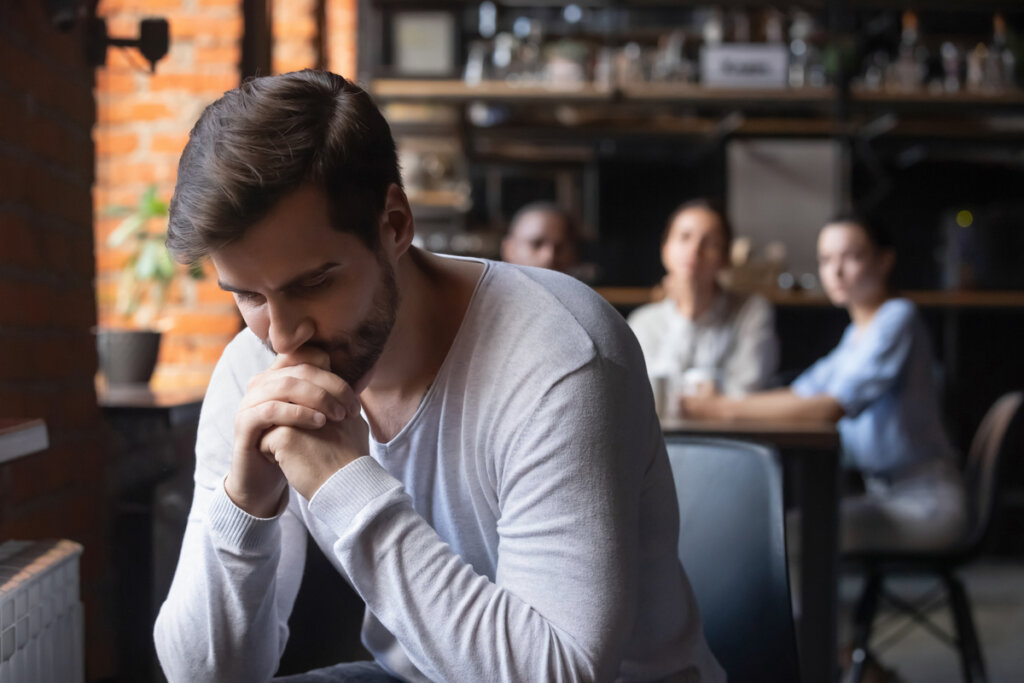Why Do You Feel Rejected By Others?


Written and verified by the psychologist Elena Sanz
It’s impossible to be liked by everyone. Indeed, most of us are aware that some people like us while others don’t. As a rule, we don’t see this as a problem and understand it’s completely natural. However, if you feel rejected by others, you may experience enormous suffering. For this reason, you need to understand the origin of the feeling so you can deal with it.
As a matter of fact, if you perceive that you’re rejected by your environment, the difficulty most likely lies in you. Not in the way you are, but in your attitude. It’s not that there’s something inherently bad or unpleasant about you. It’s more about the way you interpret what happens and how you react to it.
Why do you feel rejected?

The wound of rejection
Lise Bourbeau defined five emotional wounds generated during childhood that affect the way we perceive ourselves and the world. One of them, the deepest, is the wound of rejection. It originates when parents despise a child, refuse to be in their company, or are critical and resistant toward a part of their personality. Or, at least, when the child perceives it that way.
If you experienced rejection during your childhood, you’ll suffer the consequences in adulthood. For example, you’ll be especially susceptible to any situation that reminds you of whoever or whatever caused your pain. Moreover, your threshold of rejection will be lower than normal and you’ll tend to overly focus on any critical reaction from others.
Furthermore, if you believe that you’re worthless and that others despise you or don’t accept you, you might start behaving in ways that give shape to your fears. In fact, often, it’s not so much about the situations you experience but the meaning that you give them.
An inappropriate attitude
If you feel rejected in everyday life, you must remember that internal experiences are based, in part, on objective reality. So, others are probably not rejecting you, as a person, but your attitudes.
For example, you may be excessively demanding or have poor expectations of others. But, people won’t always please you and won’t always act as you wish. Moreover, if you’re dominant, controlling, or manipulative, others won’t enjoy your company.
You may need to work on your social and communication skills. If you suffer from social phobia, your fear of rejection might lead you to behave in a way that ends up making your worst fears come true. Because of your anxiety, you’ll be withdrawn, uncomfortable, and unnatural when interacting with others. Therefore, the answers you receive from others won’t always be the most satisfactory.
You’re rejecting yourself
The law of the mirror is often an extremely useful strategy to understand and solve the problems of rejection. It claims that when you feel rejected by others, you’re actually likely to be rejecting yourself. When you don’t feel valuable, you show yourself as insecure and in need of external acceptance. As a result, the slightest sign of contempt will deeply affect you.
On the other hand, if you wholeheartedly approve of yourself, you don’t feel the need to please others. You accept that you can’t please everyone and focus on developing bonds with those with whom you feel an affinity. Moreover, you reflect your inner security. This makes you appear more attractive and charismatic in the eyes of others. So, in turn, you receive more positive reactions from them.

If you feel rejected, accept yourself
Finally, if you see yourself reflected in any of the above, or frequently feel rejected, you must understand that the answer lies in you. Begin by healing your emotional wounds so that they stop repeating themselves. Stop finding them in your present.
You can start by accepting yourself unconditionally. Find the approval you seek and need from others in yourself. If you do this, your attitude will significantly change, and so will your relationships. And, when you change, everything will change.
It’s impossible to be liked by everyone. Indeed, most of us are aware that some people like us while others don’t. As a rule, we don’t see this as a problem and understand it’s completely natural. However, if you feel rejected by others, you may experience enormous suffering. For this reason, you need to understand the origin of the feeling so you can deal with it.
As a matter of fact, if you perceive that you’re rejected by your environment, the difficulty most likely lies in you. Not in the way you are, but in your attitude. It’s not that there’s something inherently bad or unpleasant about you. It’s more about the way you interpret what happens and how you react to it.
Why do you feel rejected?

The wound of rejection
Lise Bourbeau defined five emotional wounds generated during childhood that affect the way we perceive ourselves and the world. One of them, the deepest, is the wound of rejection. It originates when parents despise a child, refuse to be in their company, or are critical and resistant toward a part of their personality. Or, at least, when the child perceives it that way.
If you experienced rejection during your childhood, you’ll suffer the consequences in adulthood. For example, you’ll be especially susceptible to any situation that reminds you of whoever or whatever caused your pain. Moreover, your threshold of rejection will be lower than normal and you’ll tend to overly focus on any critical reaction from others.
Furthermore, if you believe that you’re worthless and that others despise you or don’t accept you, you might start behaving in ways that give shape to your fears. In fact, often, it’s not so much about the situations you experience but the meaning that you give them.
An inappropriate attitude
If you feel rejected in everyday life, you must remember that internal experiences are based, in part, on objective reality. So, others are probably not rejecting you, as a person, but your attitudes.
For example, you may be excessively demanding or have poor expectations of others. But, people won’t always please you and won’t always act as you wish. Moreover, if you’re dominant, controlling, or manipulative, others won’t enjoy your company.
You may need to work on your social and communication skills. If you suffer from social phobia, your fear of rejection might lead you to behave in a way that ends up making your worst fears come true. Because of your anxiety, you’ll be withdrawn, uncomfortable, and unnatural when interacting with others. Therefore, the answers you receive from others won’t always be the most satisfactory.
You’re rejecting yourself
The law of the mirror is often an extremely useful strategy to understand and solve the problems of rejection. It claims that when you feel rejected by others, you’re actually likely to be rejecting yourself. When you don’t feel valuable, you show yourself as insecure and in need of external acceptance. As a result, the slightest sign of contempt will deeply affect you.
On the other hand, if you wholeheartedly approve of yourself, you don’t feel the need to please others. You accept that you can’t please everyone and focus on developing bonds with those with whom you feel an affinity. Moreover, you reflect your inner security. This makes you appear more attractive and charismatic in the eyes of others. So, in turn, you receive more positive reactions from them.

If you feel rejected, accept yourself
Finally, if you see yourself reflected in any of the above, or frequently feel rejected, you must understand that the answer lies in you. Begin by healing your emotional wounds so that they stop repeating themselves. Stop finding them in your present.
You can start by accepting yourself unconditionally. Find the approval you seek and need from others in yourself. If you do this, your attitude will significantly change, and so will your relationships. And, when you change, everything will change.
All cited sources were thoroughly reviewed by our team to ensure their quality, reliability, currency, and validity. The bibliography of this article was considered reliable and of academic or scientific accuracy.
- Bourbeau, L. (2011). Las cinco heridas que impiden ser uno mismo. OB STARE.
- Noguchi, Y. (2010). La ley del espejo. Comanegra.
This text is provided for informational purposes only and does not replace consultation with a professional. If in doubt, consult your specialist.







